The extortion of IOUs for money that wasn’t received, collection of signatures on clean sheets or fabrication of evidence on the Andijan events – which lie told by Nadejda Atayeva is the worst?
Galima Bukharbaeva/Public interest investigation
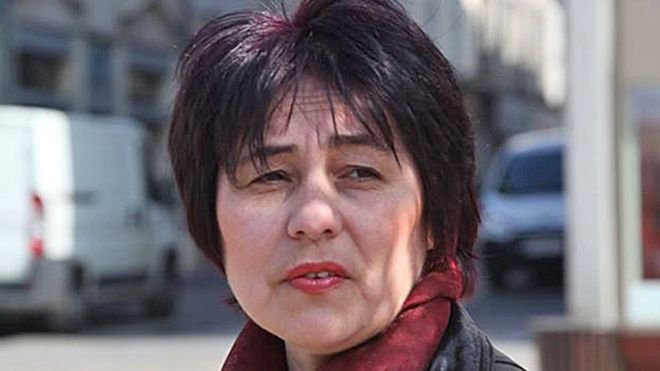
The facts of this investigation do not constitute a sensational expose as everything you read in this piece has been known by a great number of people for many years.
Some, however, have protested but their attempts to draw public attention have been unsuccessful… Why?
My interviewees said that many of them were disgusted by a petty and dirty nature of the showdown, shame and unwillingness to wash one’s linen in public, as well as fear of the opponent’s audacity and feeling of her impunity.
But the silence of many people and the uncontrolled situation have led to Uzbekistan’s civil society being practically headed by a product of the Karimov regime.
Moreover, it has established all its old habits: lies and scam, public opinion manipulations and silencing of voices, insulting and humiliation of people, blackmail and threats – shortly, all that bog, slimy and stinky.
Uzbek activists, who took part in this investigation, finally decided to end this mess. The results of it has one aim of restoring the truth, justice and moral standards of Uzbekistan’s civil society.
Nadejda Atayeva
The 49-year-old Nadejda Atayeva is living in France and styles herself as president of the Human Rights in Central Asia association. Having started her human rights career years after leaving Uzbekistan, she has fared quite well.
Atayeva confidently speaks at global events devoted to Central Asian problems as an expert and fighter for human rights and her reputation among international organisations and donors supporting her seems unquestionable.
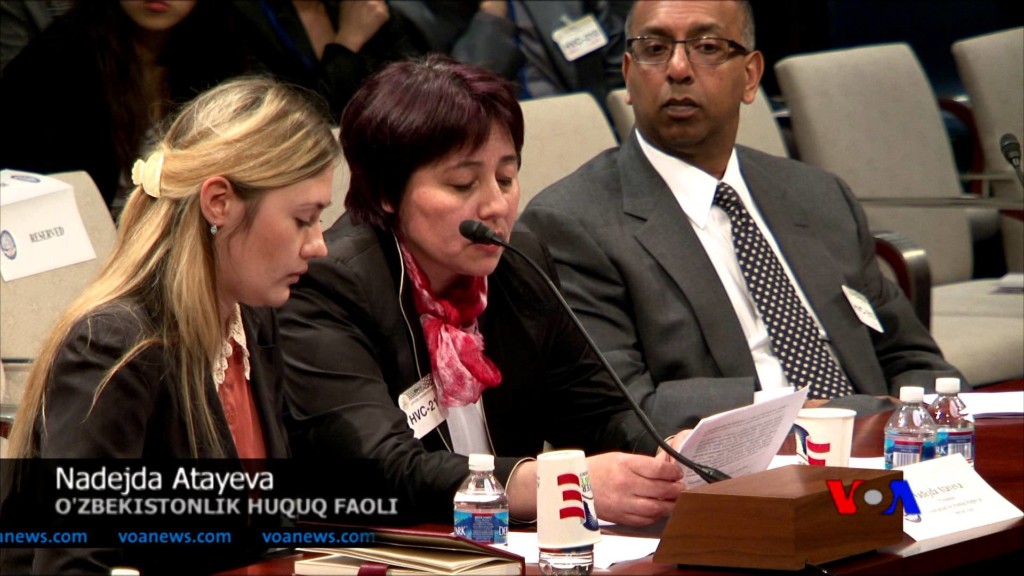
This month Alisher Ilhamov, a representative of the Open Society Foundation (OSF, aka the Soros Foundation) said that the history of global human rights movement is the history of actions by individuals, counting himself and Atayeva among them.
But he was talking about money. To be precise, about the fight of these two people and other “individuals” who joined them for about $1bn, seized by Switzerland from Gulnara Karimova, the eldest daughter of the first Uzbek president.
This article will also discuss money but as well as other things. Dissidents and activists from Uzbekistan who spoke to me insisted that they want to talk about everything.
Atayeva and NZI
Born in Uzbekistan’s Syrdarya Region, Nadejda Atayeva did not care about human rights when she lived in her home country. She cared about something else – baking bread. With her 40-year-old brother Kahramon and other relatives she worked under the patronage of her father Alim Atayev, who headed the state-run Uzdonmahsulot grain company between April 1997 and April 2000.
According to proceedings of a Tashkent court which convicted the Atayevs – the father, son and daughter – to prison terms ranging from six to nine years, the family had embezzled funds of Uzdonmahsulat to the tune of over $3.1m just within three years.
Nadejda occupied the post of a manager at NZI LLP. The firm supplied polypropylene bags to the grain company. According to court proceedings, Uzdonmohsulot’s regional enterprises were forced to sign contracts with NZI on supplies of bags and those enterprises that refused to do so were told that they would have problems with the head of the company, Alim Atayev.
At the same time, NZI regularly increased the price of its products, for example, the price of one bag increased from 50 to 101 sums between January and December 1999, but enterprises did not have an opportunity to refuse to sign contract with this company and choose another supplier.
During our meeting in Washington in May 2014 Atayeva questioned the independence of the Tashkent city court but confirmed that she was an expert on polypropylene bags and that her firm and revenues would not have been possible without her father’s role at Uzdonmahsulot.
Flight and long-lasting asylum
The Atayevs managed to avoid arrest and conviction in Uzbekistan by fleeing the country. This was a scandalous event in the country: in 2000 everyone became aware that the chairman of Uzdonmahsulot fled the country and the Atayevs went silent and disappeared.
Nadejda’s reappeared at the beginning of 2005. She offered the London-based Institute for War and Peace Reporting to conduct an interview with her about the corruption of the Karimov regime but the London newsroom rejected the material. The offer sounded too biased, explained my colleague who was a coordinator of the IWPR’s Central Asian programmes.
As a result, Atayeva made her debut criticising the Karimov regime thanks to the Tashkent-based young journalist Ruslan Sharipov, who published an interview with her on the centrasia.ru website.
Transformation into political opposition is a usual thing for many former representatives of the regime and its accomplices: their claim that they are opposition figures and human rights defenders is an easy way to avoid extradition and trial back at home.
However, it was the Andijan events of 13 May 2005 when government troops opened figure against protesters on Bobur Square without warning and continued to kill everyone until there was no-one alive finally helped the Atayevs to secure a footing in Europe.
The monstrosity of the Andijan killings helped many Uzbek citizens who fled to Western countries obtain political asylum: everyone started claiming that they should not be sent back to the bloody regime in Uzbekistan even if they had nothing to do with the Andijan events or human rights or political opposition.
According to France’s migration services, Nadejda Atayeva obtained asylum in France on 22 July 2005. Centre1 has sent a pile of questions to Atayeva, including one asking why the obtaining of her asylum dragged for so long. But she hasn’t answered any of these questions.
Fifth anniversary of Andijan events
In April 2010 Jacqueline Hale, a staffer from the OSF, asked her colleagues from well-known and respected international organisations to send out the announcement of a roundtable entitled “Uzbekistan: five years after Andijan” in the European Parliament building in Brussels on 4 May.
The organisers of the events were billed as Uzbekistan Initiative-London, Amnesty International, the Human Rights in Central Asia association, FIDH international federation for human rights, International Crisis Group, Human Rights Watch, Front Line, OSF, Press Now (currently Free Press Unlimited) and the Uzbek-German Forum for Human Rights.
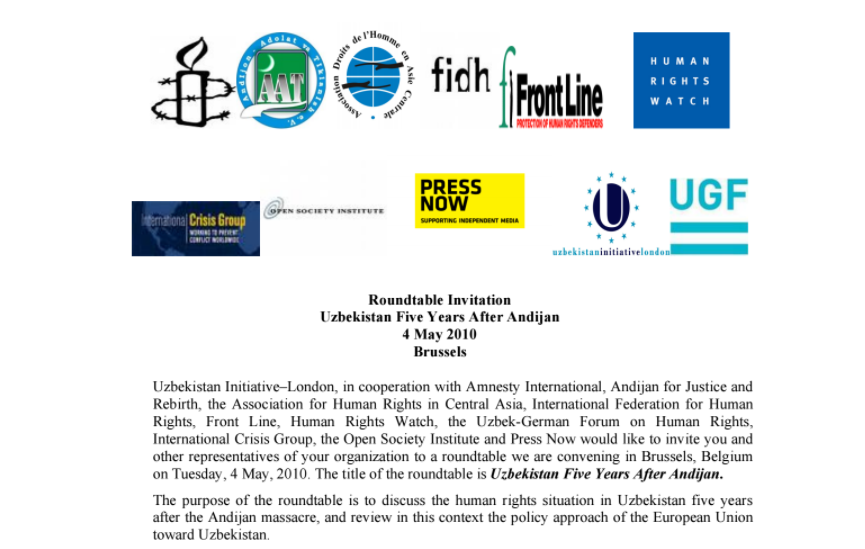
According to its agenda, the chair of the European Parliament’s commission on human rights, Heidi Hautala, and Niccolo Rinaldi, a member of the European Parliament’s delegation in Kazakhstan and Kyrgyzstan, were expected to speak at the event.
The key moment of the roundtable was expected to be the screening of a new documentary called “The stories of Andijan” featuring an interview with some forensic pathologist in addition to the discussion of Uzbekistan’s human rights record after the Andijan killings.
His identity was expected to be disguised for “security concerns” and he was filmed in the shadow to hide his look and his voice was changed.
But the authenticity of his words was expected to be proved by Nadezhda Atayeva, who made the film.
“I was all worried”
The night before the screening Atayeva was very worried. In a letter to the prominent member of Uzbek opposition and human rights activist, Dilorom Iskhakova, who worked with her in Tashkent, she begged her to quickly take the family of her film character out of Uzbekistan:
“Dilorom-opa, please tell me that you understood that this family should be quickly taken to Shymkent. It is not important how you do it flying via Almaty or on car… I am very much worried. In the morning I will speak and I should make a report but this information may turn into horror for this family if they don’t leave urgently.”
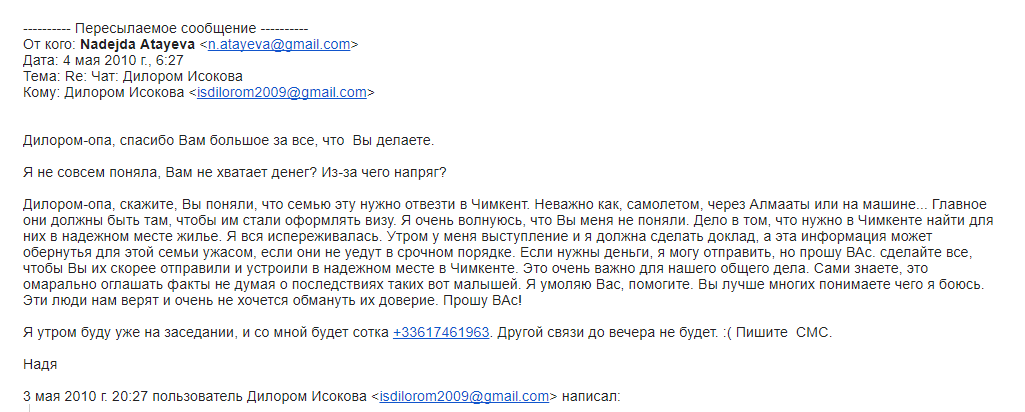
That the wife and two children of the eyewitness from Andijan were still in Tashkent on the day of the screening could be considered as quite irresponsible and scandalous act by the human rights activists, but, according to Iskhakova, there was no reason for concern.
She satisfied Atayeva’s request and managed to send the forensic pathologist’s wife and two children aged six and eight to Almaty. They flew out of Tashkent without having any difficulty.
Iskhakova said that it was obvious that the family is “clean” and it had no surveillance or their names were not blacklisted.
And this circumstance, Iskhakova says now, reinforced her earlier suspicion which she, of course, shared with Atayeva.
Forensic pathologist without diploma
The point was that the forensic pathologist Atayeva greedily clung to was not listed as a graduate of any medical university in Uzbekistan, above all Tashkent and Andijan institutions.
Moreover, when the film was presented in Brussels, Iskhakova, she said, was worried about Atayeva, fearing that he was planted by Tashkent to destroy Atayeva’s organisation and activities.
Iskhakova reassured herself that perhaps he didn’t graduate from a medical university but a college and worked in the morgue as a nurse but claimed to be a doctor.
The film was shown in Brussels in the first half of the day when important guests were still at the event.
The film of the BBC’s former Central Asia correspondent Monica Whitlock: “Through The Looking Glass: The Andijan Massacre” consisting of maximum amount verified video and audio information, as well as testimonies of witnesses and victims of the events was shown in the evening during the dinner.
Uzbek human rights activist Mutabar Tajibayeva, head of the Fiery Hearts Club who is now living in France, attended the roundtable in Brussels and recalled that the dramatic monologue of the forensic pathologist had impressed the international audience.
The dark silhouette of a man on the huge screen told his story for 10 minutes, claiming he was arrested following the Andijan events and spent in custody in a National Security Service (SNB) prison the entire summer – over three months. In custody he was tortured and raped.
In September 2005 he was released and was forced to work in the morgue of the Andijan regional hospital where he worked until February 2006. He was tasked to make autopsies on hundreds of bodies with gunshot wounds (his duties included removing bullets from bodies) and traces of sexual violence the morgue received every day.
Teacher of French from Kokand
Following the Brussel screening Dilorom Iskhakova knew almost everything about the “forensic pathologist”.
The first pieces of information about the man she learnt from his close relative that he was not any kind of doctor but a teacher of French. After the Brussels event this information shocked her.
The activist decided to conduct her own research and soon she learnt that Umid Abdunazarov, born in Kokand in 1977, was an impostor who masquerading himself as a doctor.
In 2003 he graduated from the French language department of the Fergana State University. He never was under arrest and never lived in Andijan.
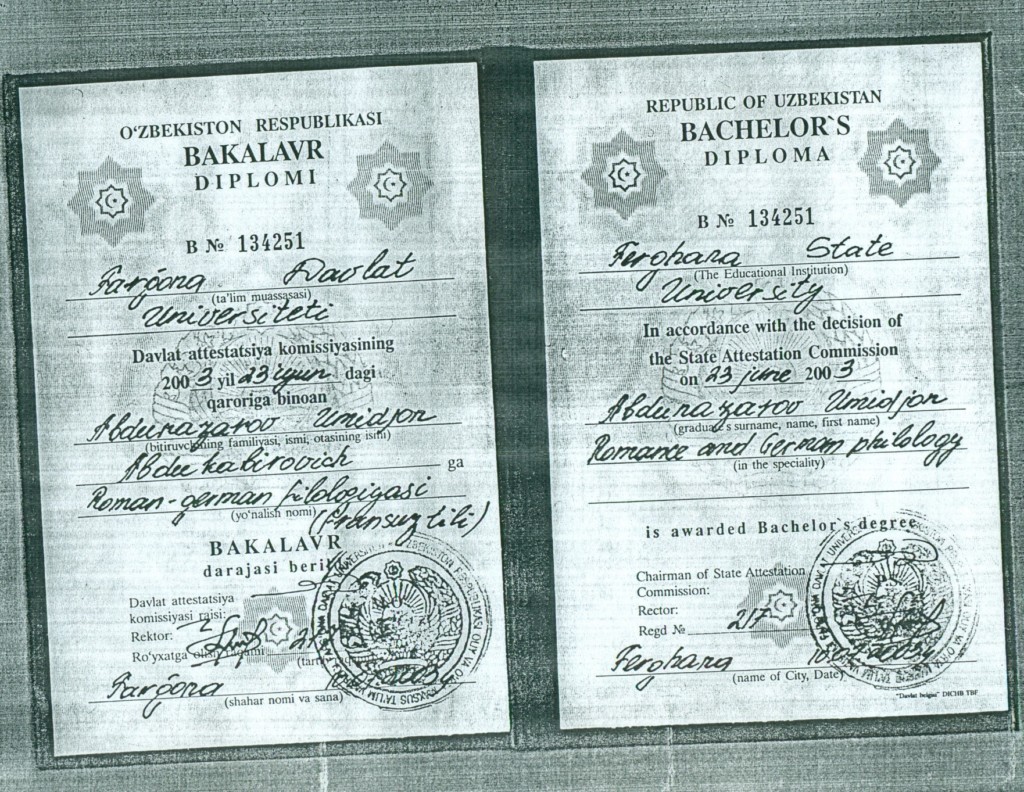
His first official job was that of a translator at the Fergana Oil Refinery between 2000 and 2003.
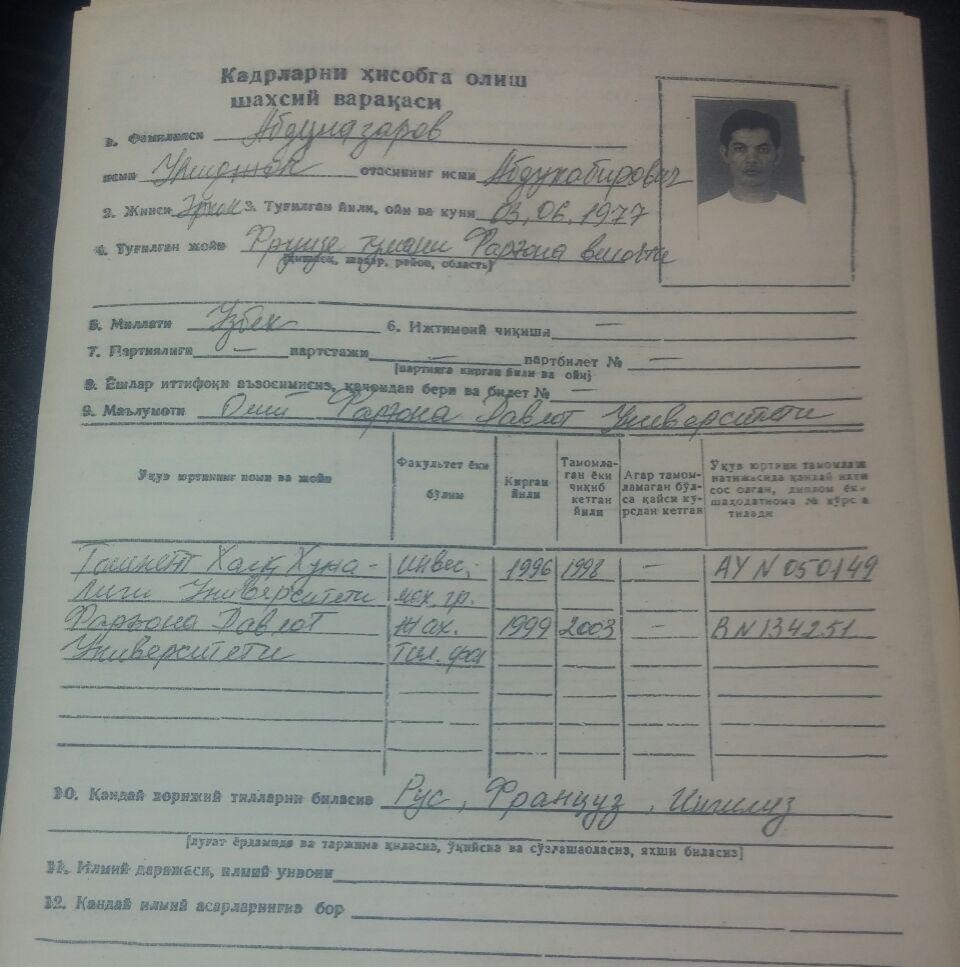
After graduating from the university he became a teacher of French at School No 32 in Kokand where he worked between August 2004 and September 2006, precisely he claimed to be under arrest in Andijan and worked in the morgue.
All the information about Abdunazarov Iskhakova obtained via documents such as a diploma and personal file.
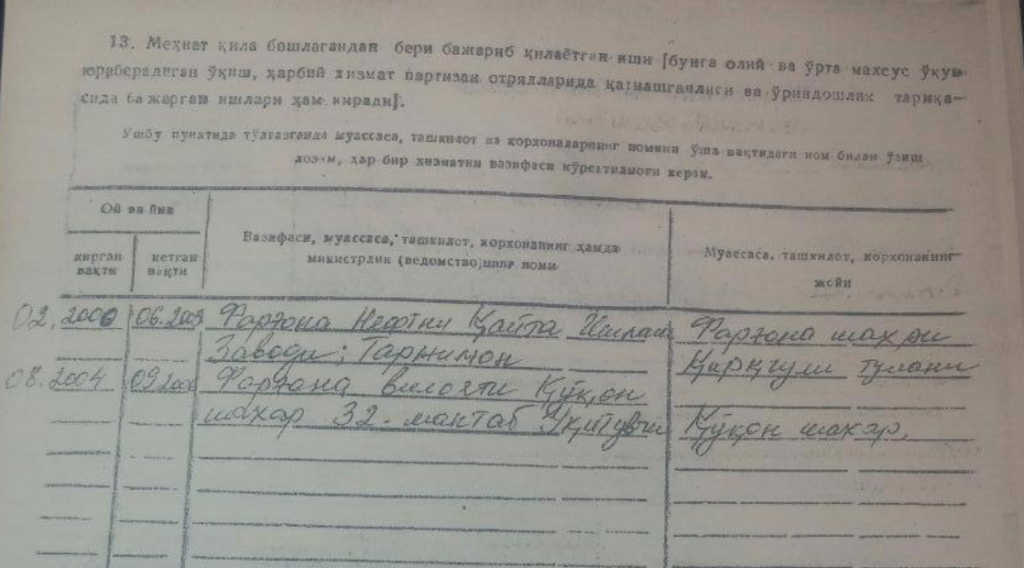
She didn’t move even eyebrow
Iskhakova notified Atayeva about the results of her research and information she dug out about Abdunazarov.
This took place in November 2010, now recalls Iskhakova, before she went to Moscow for a medical treatment. However, Atayeva did not seem to have been shocked from what she had heard.
Perhaps she was then already worried about her deception of the international audience which supported her and guarded it, fearing exposure.
In June 2010 Monica Whitlock’s assistant called Iroda asked one of Uzbek human rights activists to find the “forensic pathologist” because Whitlock wanted to talk to her as she was fighting for Andijan victims.
Iroda recalled that Atayeva had just ignored her request.
Now Abdunazarov’s identity has also been confirmed by London-based journalist who worked for the BBC and Radio Liberty’s “Current time” Shakhida Tulyaganova, aka Shakhida Yakub.
As the head of Uzbekistan Initiative-London, Tulyaganova was one of co-organisers of the Brussels roundtable along with Atayeva and she filmed the “forensic pathologist”.
Responding to my recent inquiries Tulyaganova confirmed that she had interviewed precisely Umid Abdunazarov but, she said, she had no idea who he was and that she hadn’t tried to establish the authenticity of his claims since she was only performing Atayeva’s request.
“It wasn’t my story. Atayeva asked me to film so I just filmed,” she told me.
Tulyaganova gave me Abdunazarov’s email address but he hasn’t answered my questions.
He is now living in France. In 2010 having secured references from former ICG director Alain Deletroz and from Tulyaganova and Atayeva he obtained asylum in that country.
Show must go on!
In April 2011 the Human Rights in Central Asia association released a report entitled “Our torturers know that they won’t face justice…”
The report was based on testimonies of the very same “forensic pathologist”. This means it was released six months after Iskhakova exposed his identity and Atayeva knew about it.
The Moscow-based Fergana News website was one of the few publications which paid attention to the report but even it doubted the authenticity of facts it contained in its headline: “Story of 300 Andijan residents tortured to death raise suspicion but in Uzbek prisons [people are] indeed tortured and killed”.
Then the publication offered its space for the dubious report and even published samples of “green cards” allegedly the Andijan morgue filled on them information about bodies it received.
The entire report, given the reader has great patience, leads to one conclusion: nonsense.
But the reader realises why the report was extremely absurd: it is hard to lie honestly for the teacher who wants to settle in France and the seller of polypropylene bags who wants to boost her human rights credentials.
Especially about the Andijan tragedy without seeing it and without living through it.
Report
Umid Abdunazarov, who is now 40, the report claimed, autopsied 500 bodies at the Andijan morgue, including a minimum of 300 with fresh wounds, including gunshot wounds.
The bodies were supplied to the morgue by SNB operatives and they contained only seven-digit numbers which were registered on “green cards”.
There were so many bodies, a “witness” claimed, they were piled on the floor and they stunk.
Where did those bodies come from? Why didn’t anybody report about mass killings or mass deaths in prisons at that time? Why were the bodies taken exactly to the Andijan morgue. All victims were locals – isn’t it too much for Andijan Region or even for the entire Fergana Valley?
Why did the SNB require their autopsies, especially taking out bullets when it is known that after the Andijan events most bodies were immediately and secretly buried? And how did the convict who was “badly tortured” managed to get released and later was trusted with such a secret mission – work in the morgue?
All these questions and suspicion, Atayeva believes, were dispersed by the claim that the “forensic pathologist’s” testimonies were confirmed by Tashkent-based journalist Husnutdin Kutbitdinov, who went to Andijan in late May 2005 and were proven by some reports of missing people in Uzbekistan between 2008 and 2010.
This is not a joke as the report did say that. There is no sense in discussing this text composed by impostors. Just for record: the first phrase of the testimonies from the “worker of the Andijan morgue”: “Actually I ended up on Bobur Square [in Andijan] accidentally. I was on leave from 12 May [2005] and that day my classmates from the medical institute and I were going to visit friend in Andijan…”
Why?
Atayeva didn’t answer my question: why?
So I asked Dilorom Iskhakova this same question.
She said she didn’t know why Atayeva decided to go for such colossal forgery, but thinks that like journalists and human rights activists she also wanted to own her own story about Andijan.
Andijan highs and Atayeva’s lows
When I collected information for this article and talked to many Uzbek activists who dealt with Atayeva, I thought that the main findings of the research would be their testimonies about her financial machinations.
However, after finding out about the Andijan forgery, the fraud of the alleged human rights activists with IOUs and even insulting and humiliation of the best representatives of the country’s civil society and real victims of the Karimov regime seem a petty change.
Atayeva falsified Andijan.
She betrayed real witnesses of the massacre and undermined international human rights organisations who threw their weight and reputation behind her events. She also committed crime against Andijan and its victims.
Clean sheet
Whether it is worth noting here that in addition to everything else at each meeting she used to ask Dilorom Iskhakova to sign 30-40 clean sheets, saying that she would use them in her some future campaigns but until now no document signed with the activist has emerged.
Iskhakova thinks that by using her signature Atayeva wrote off some money.
The activist also questions Atayeva’s behaviour when she sometimes sent money to her daughter Sevinch Parpiyeva and asked her to write IOUs without indicating sums she received and add that she received money because her mother didn’t have a passport then.
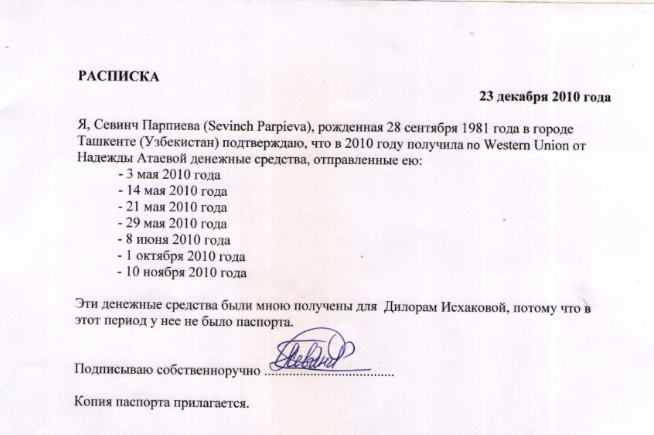
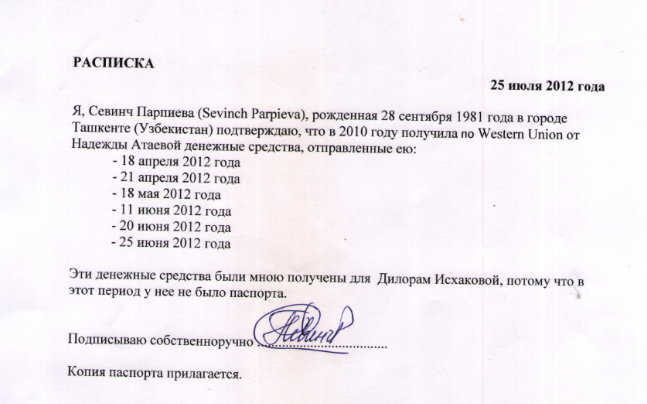
Iskhakova said that then she did have passport which is confirmed by her own receipts of money sent by Atayeva via Western Union.
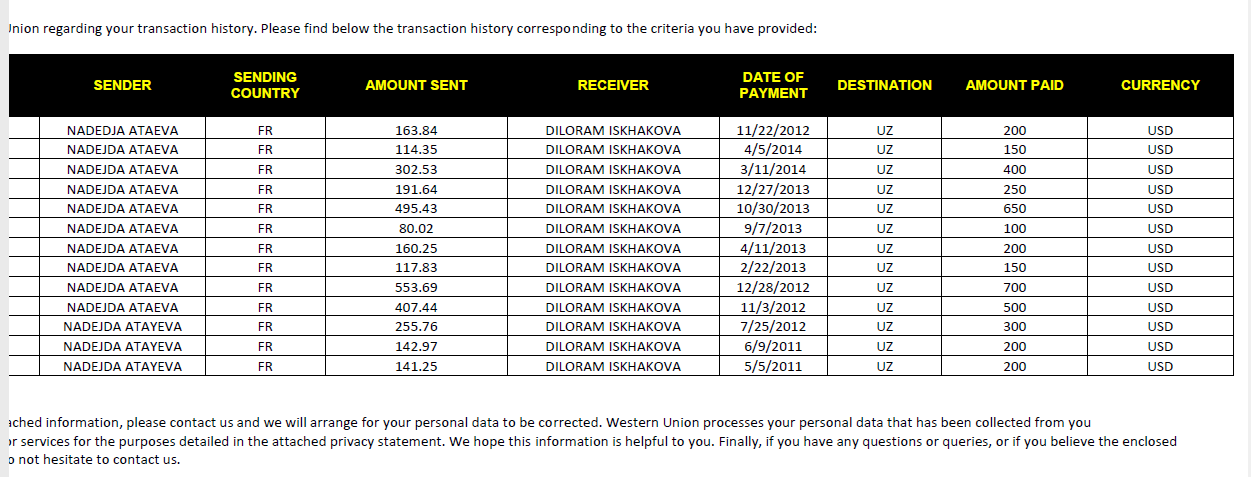
Mutabar Tajibayeva also confirmed that she used to sign clean sheets for Atayeva.
She also said that when she received a financial assistance after she was released from prison in 2008 she loaned Atayeva €3,500 but she hasn’t yet fully received the money back.
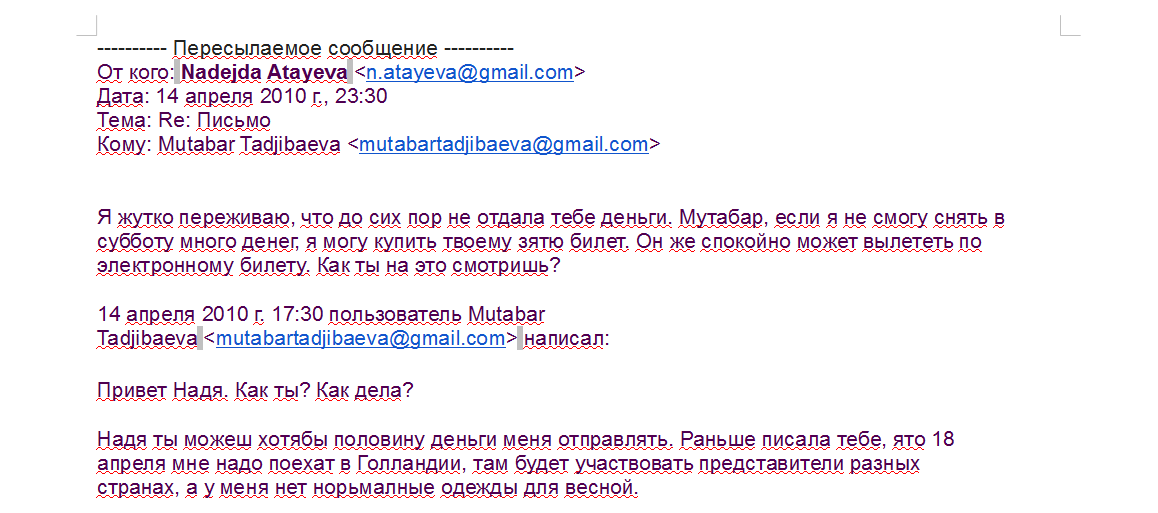
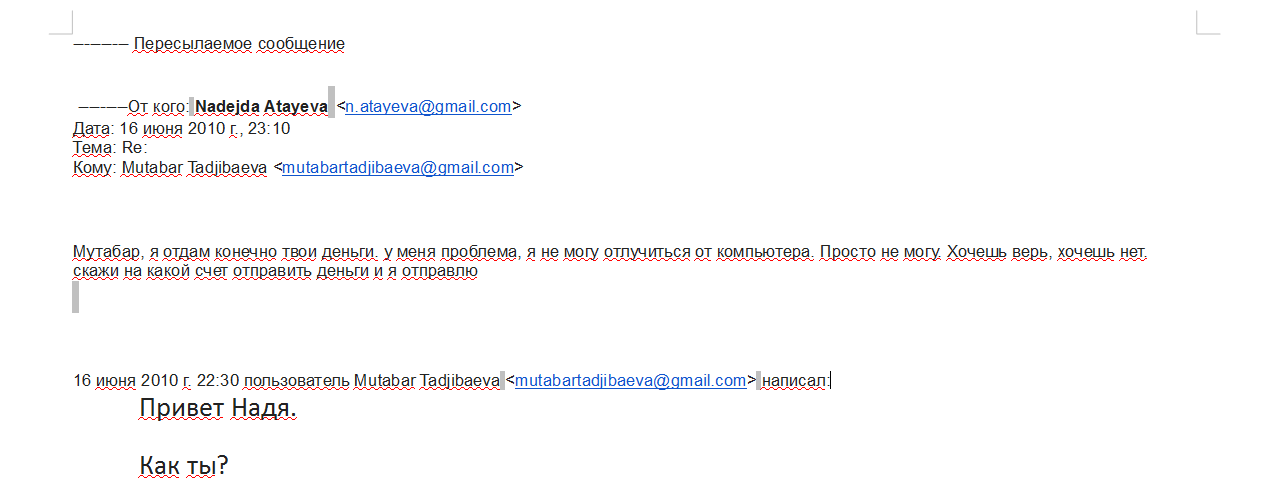
IOUs and slips
An analyst from Tashkent who is now living in Europe said that in Almaty on 13 September 2007 he received €250 via Western Union for writing a report for Atayeva.
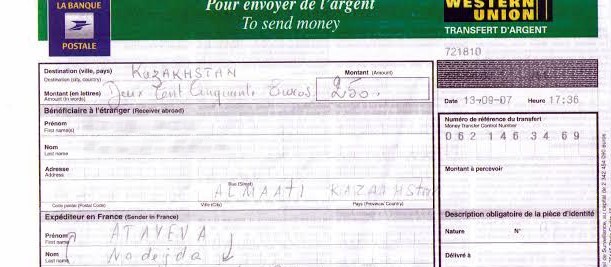
Several months later, on 18 January 2008 to be precise, he wrote a letter to Atayeva with a request to provide him with financial assistance “to pay bills and in connection with the birth of his daughter”.
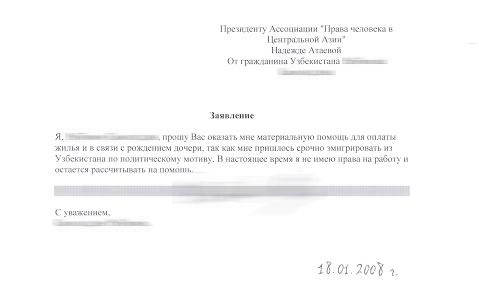
On 27 January he wrote an IOU that he had received financial assistance worth €550 indicating the address in Almaty he received the money. 27 января он подписывает расписку, что получил помощь в размере 550 евро, указав местом получения адрес в Алматы.
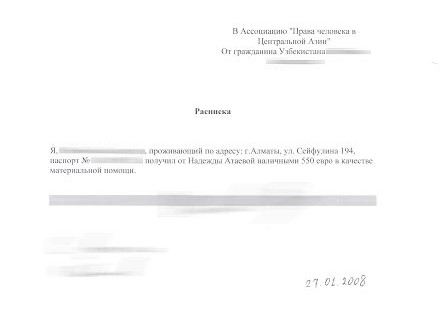
However, the Uzbek analyst says now that he did not receive any financial assistance from Atayeva and his money dealings with her was limited only to the fee of €250 he received for the report. Moreover, he said, at the time of asking her to help financially he was already living in Europe but had to claim he was still living in Almaty.
Blackmail and threats
In March 2015 Atayeva showed another recipient what his refusal to sign the needed number of IOUs and produce bills she and her association had nothing to do might lead to.
In correspondence with Uzbekistan-based filmmaker Abdulaziz Makhmudov she asked him to help her by signing an IOU because she couldn’t find an IOU for money she sent to him.
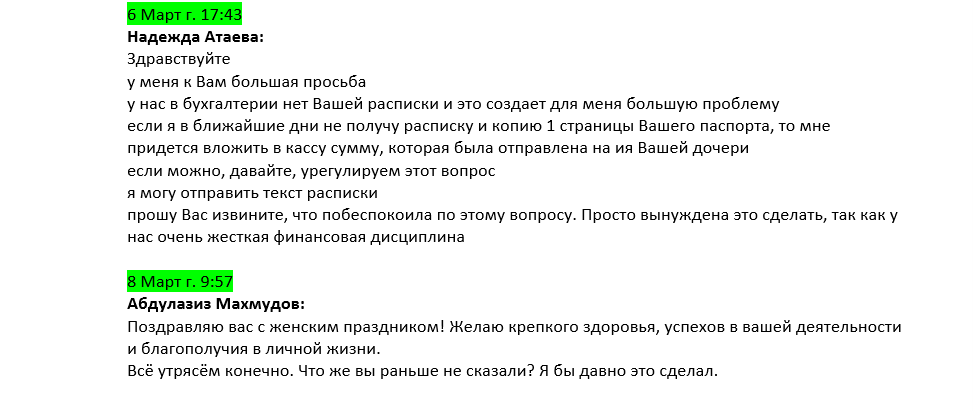
Having agreed to help, Makhmudov immediately met Atayeva’s courier, Vasily Markov, a journalist, in Tashkent and gave an IOU that he received $1,000 in Moscow in June 2010 (the money was sent to her daughter).
But Atayeva was still unsatisfied with the IOU and asked Makhmudov to meet the courier again to give another IOU indicating another date.
She also asked him to find air tickets and telephone and Internet bills for a period between “June and 30 December 2010, ie the end of the financial year”.
Makhmudov refused to fulfil this request as he thought one IOU indicating the full sum and time and place he received the money was enough.
Then Atayeva changed her tack and on 25 March wrote: “Good day, I have an impression that you decided to create problems for me. You shouldn’t be doing this! You received money and it is a serious sum. Give me bills or return the money. I promise you a very big scandal if you don’t do it. I am absolutely seriously saying that…”
Four hours later Atayeva made threats that he would report his daughter to the Russian tax authorities: “I talked to our lawyer and we have a possibility to send an inquiry to Russia and find through the Tax Committee of Russia the recipient of the funds – your daughter – and demand a report how she had used $1,000 she had received from us.” And she gave Makhmudov a week to fulfil the request.
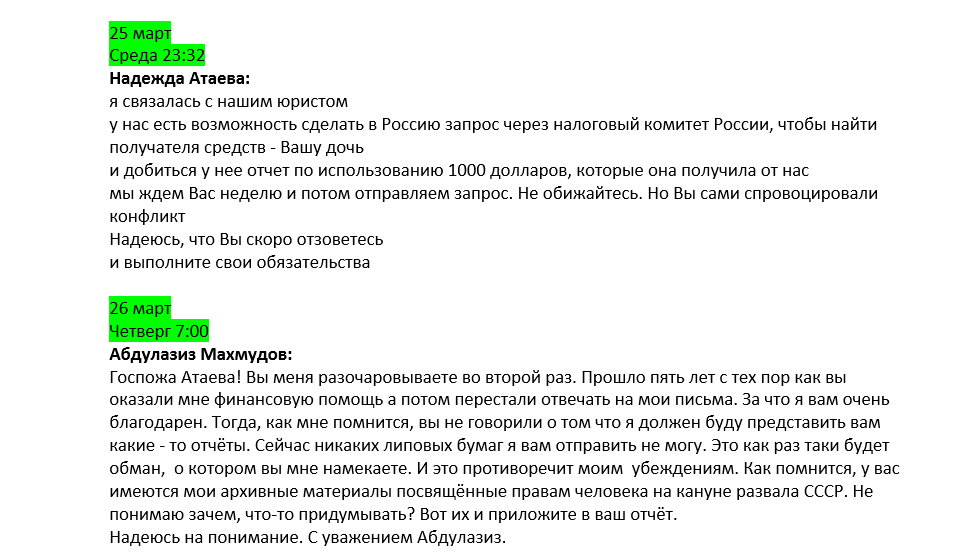
On 26 March the shocked filmmaker reminded her that the money he had received as a fee for giving her his video archive about Uzbekistan’s human rights record in 1991 before the breakup of the Soviet Union.
Then, he said, there was no talk of any bills. “Now, I cannot send you any fake papers. This would be the exact deception you are hinting about to me. And this contradicts my convictions,” he said.
Atayeva responded that she would send her inquiry about his daughter to Russia after two more days. At the same time, she tried to persuade the man and changed her tactic: “Maybe, I will be able to do something for you in future?” Then she urges him: “Let’s think again…”
Grant and trip to Europe
Many activists in Uzbekistan also spoke of their dealings with Atayeva ending with an impression that they had been used as a disposable syringe.
Rights activist Surat Ikramov said that he had given her the archive he had collected about persecutions and trials on charges of “encroachment on the constitutional system” under Article 159 of the Criminal Code. In return, Atayeva promised him a trip to Europe – Ikramov hoped to find a publisher for his book but it didn’t produce any results.
Abdulkosim Mamarasulov, activist from Jizak Region, also considers himself as one of simpletons who have been used by Atayeva.
In autumn 2013 he gave her photo and factual material about the cotton-picking campaign but the woman offered to pay for it with promises of office equipment, a grant from donors or a trip to Europe.
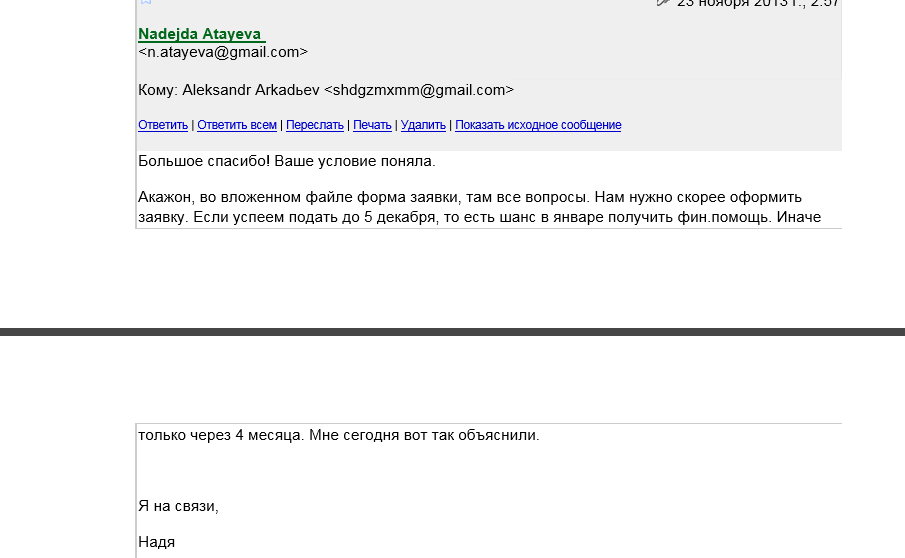
Mamarasulov received no grant and the promised fee Atayeva didn’t pay him even during a personal meeting in the US in May 2014.
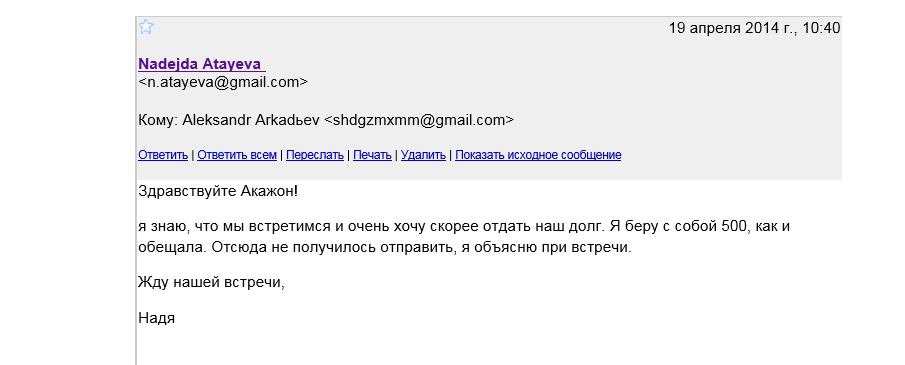
Finally, he achieved the payment for his labour in June 2014 when he published a commentary that exposed her deeds on a popular website. She immediately sent him the money.
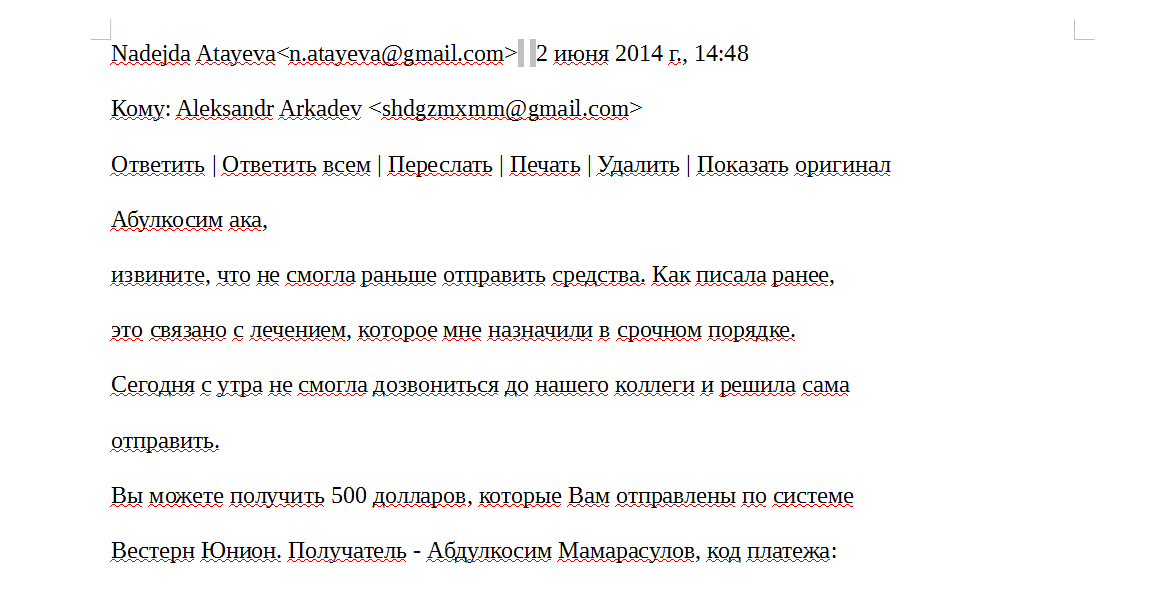
Tashkent-based political analyst Bahodir Musayev was one of the first to pay attention to Atayeva’s insults of other people, while her emails in which she denigrated Mutabar Tajibayeva laughing about her rape, forced sterilisation and torture in prison could not be read without cold blood. Atayeva didn’t fail to miss a chance to comment on Tajibayeva’s appearance that he “dressed as penniless”, while she failed to return her money.
But the worst is…
But all Uzbek activists, who were interviewed for this article, agreed that the worst of Atayeva’s machinations was the fabrication of evidence of the Andijan massacre. And this lie and this behaviour should be eradicated from the country’s civil society.
“Andijan is such a horrible tragedy that there is no need to invent something and this should not be done under any circumstance,” said Dilorom Iskhakova. “I think that the story around Umid was horrible.”
Overcoming her agitation she continued: “And to think that Andijan is a stage where people should play some roles is horrible and sacrilege…”
Galima Bukharbayeva, Editor-in-Chief of Centre-1